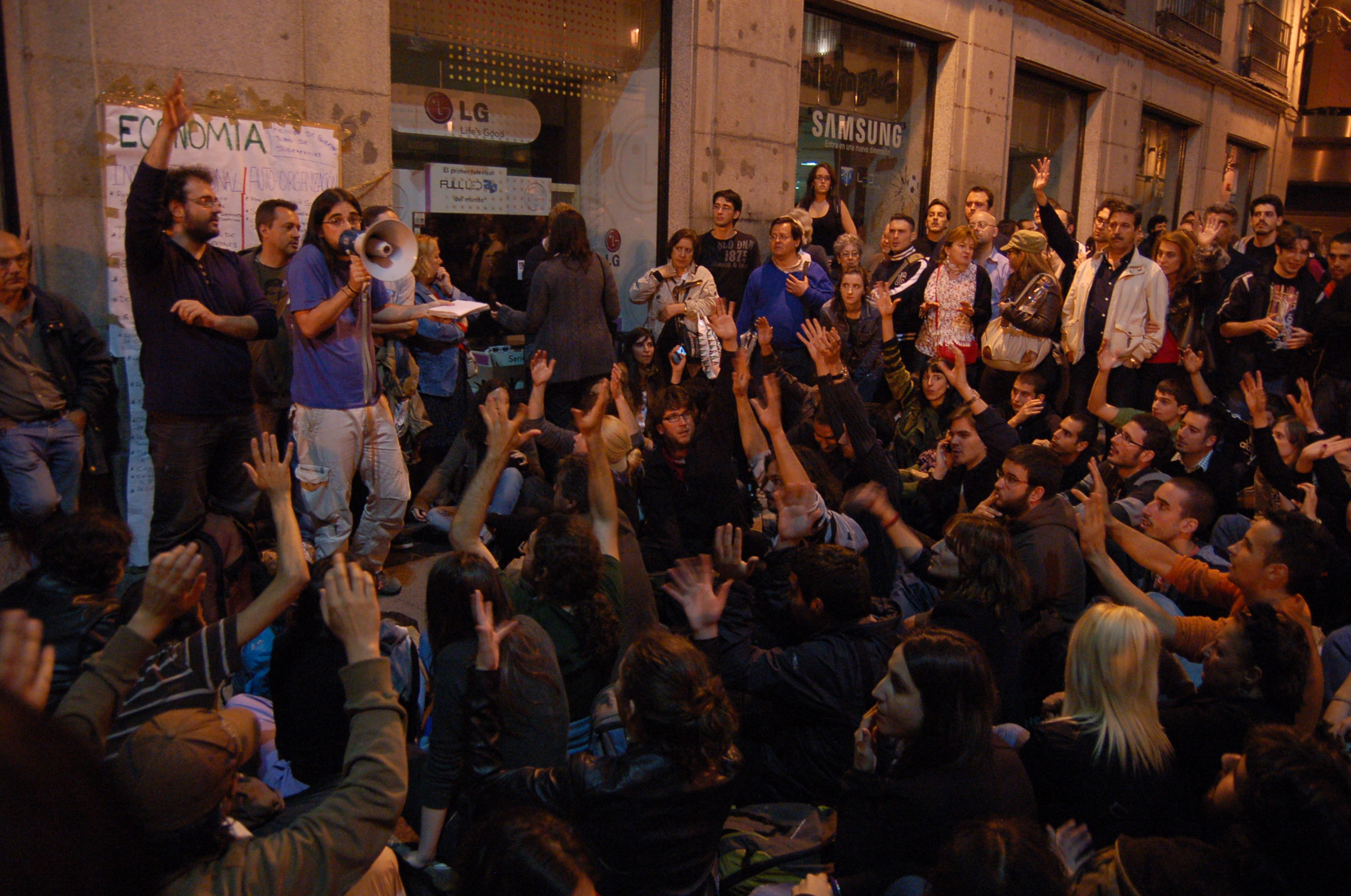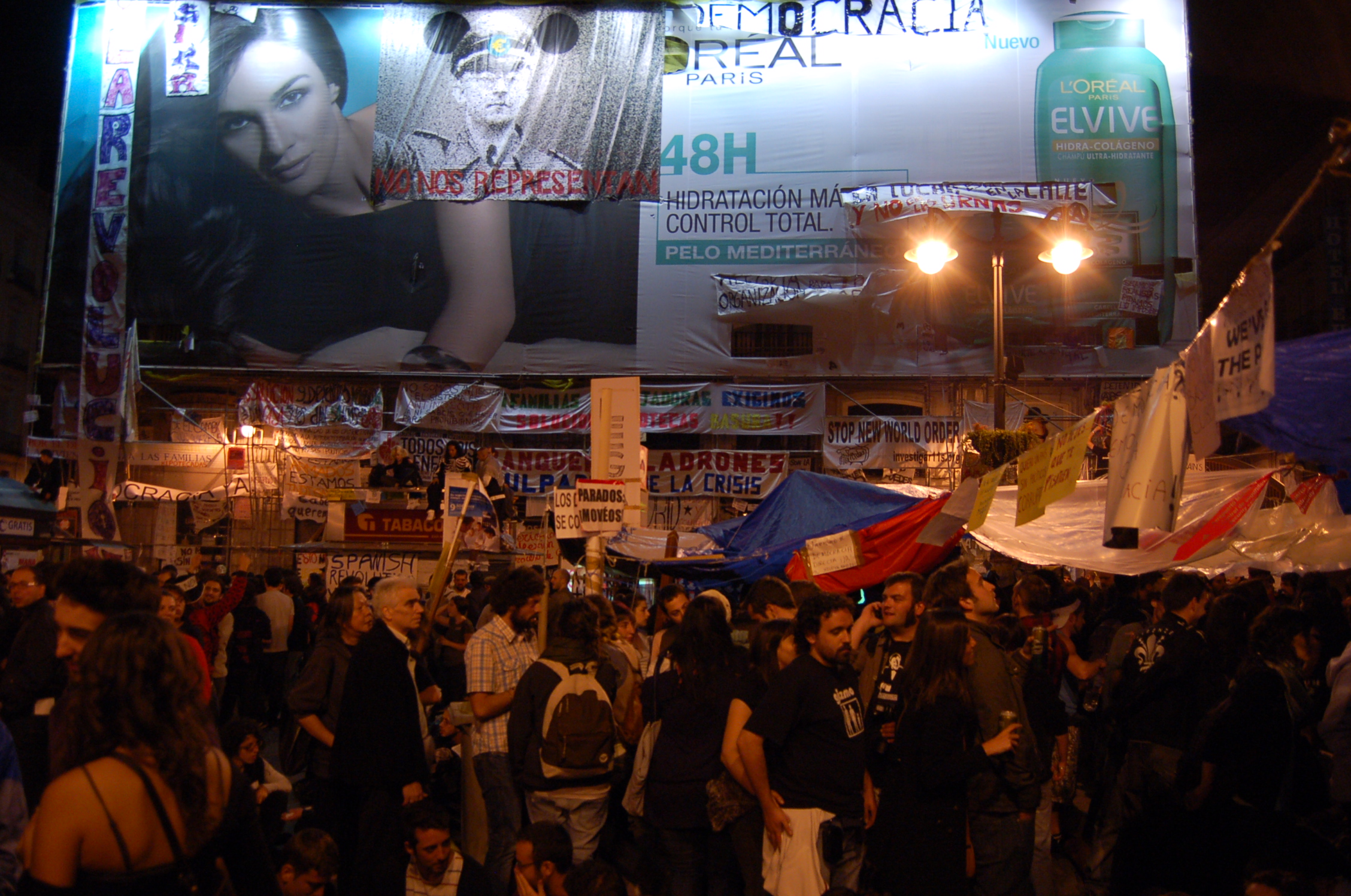WLCentral will be providing coverage from Spain on the ongoing #spanishrevolution, happening now in over eighty cities, inside and outside Spain, with thousands of people camped out claiming the streets. Contact us at @wikileaks_world or wikileaksworld@wikileaksworld.org to help us with footage, information and opinion.15MayRevolution.com provides information in English about the 15M movement. An updated agenda of protests around the world can be found here.
What started out as a programmed march on the the 15th of May, held in major and minor cities around Spain with regional elections happening on the 22nd, has grown massively: well over ten thousand people have taken the Puerta del Sol, a large square in the center of Madrid (www.soltv.tv for live streaming). The initial demonstration was planned by the apolitical platform, Democracia Real Ya (Real Democracy Now!) with a manifesto claiming an end to corrupt politicians, harsh election laws for smaller parties, financial regulation, transparency and free media. The demonstration was very successful and thousands of people, of different age groups and nationalities, showed up. Afterwards however, there was a great feeling of unrest, caused by the impotence of not knowing what to do next or how to catalyze the social movement gathered there. This led many young people to vandalism and some of them even tried to block main streets in a wild attempt to make themselves heard, resulting in rough police intervention (below) and several detained protesters.
In the aftermath of the 15M movement, and benefiting from this sense of indignation and helplessness, a different platform announced that they would camp in Sol until their demands were met. The first night an estimated 300 people showed up, making it small enough to allow the police to force them to leave. These actions, along with the video posted above, sparked interest in what was happening in Sol, and the anger felt by citizens in Spain caused thousands of people to show up on Tuesday for the demonstration, with many staying there for the night.
Others organized similar camps in over twenty cities around the countries, chanting the same slogans such as: “they call it democracy but it’s not”, “they don't represent us” or, literally, “PSOE and PP (the two major parties) are the same shit”. In Sol, the organizers, overwhelmed by the volume of the crowd, quickly started organizing a community by dividing the workload into different commissions (all made up of volunteers): cleaning, security, legal advice, infrastructure, food, external and internal communications. This last one set up a speaker in the middle of the square, so as to communicate between each other and to deliver important messages to the community. The infrastructure commission built large tents, made for shelter and to house each group’s “office”, food and blankets were provided, people brought mattresses and sofas from their homes, as well as sleeping bags, tents and cardboard boxes to coat the floor. The legal team held a brief meeting and afterwards communicated basic advice just in case the police were to crackdown on the campers. Meanwhile, external communications organized workshops to prepare volunteers for talking to the media, arranged teams of translators who would start working on social media sites and went about promoting the event on the web. The result was that in a few hours a totally self-governed mass of people, without any visible leaders, was fully functional and able to sustain the main reason behind the whole movement: the formation of public assemblies that were to enunciate the feelings and ideas of everyone present and turn them into proper policies.
Slowly, the crowd spontaneously organized itself in open and democratic debate groups that merged throughout the night into a big general assembly that started around 4AM. These assemblies served many purposes and the participants talked about many things: they used them to vote on details regarding the internal workings of the new system; they used them to express their feelings of anger without any coherence (not that it was necessary) making them the direct way of participation in the growing movement. In this sense they worked very well, knitting the community tightly around ideals and ideas that grew out of popular debate. The general assembly, however, failed, mainly because the lack of leadership made it difficult for them to concentrate on the real issue, that is, reaching a consensus large enough for a real manifesto or proposals for reform. Instead, in this first large assembly, the internal workings were discussed, maps were planned and an order of the day was voted and approved, it was intensely democratic in the sense that whenever one of the speakers said something they deemed was unacceptable, he/she was immediately removed and someone else was given the microphone. Acceptance, on the other hand, was greeted with a shaking of open palms, no applause. The meeting ended at 6AM with some serious doubts. First of all no real proposals emerged and it seemed that they would be hard to achieve without real leadership, after all, in most cases protests are held with a manifesto already prepared. How would one emerge from a crowd that was so individualistic and resentful towards anything that sounds like authority?
It is now Thursday and the camp has lasted for almost five days without police intervention. Today more than ten thousand people showed up. The square has been entirely occupied, the external communications commission has encouraged people to make their own signs and proposals and hang them around the walls, metro stations and ads. The tents have grown everyday and the facilities are better (for example, private companies have donated portable bathrooms for the camp) and well organized, with maps explaining the location of each commission. The flow of people has gotten progressively bigger, and because the media has finally paid attention, older people are appearing and are very curious about what the younger generations have to say. To their surprise they seem to agree with most of it and are willing to participate actively. Best of all, what seemed to be the problem (the lack of concrete political solutions) is turning out to be the strongest point: the assemblies have started producing, out of popular debate and participatory democracy, solutions for different aspects of life in society. Some of these were already floating about several webpages affiliated with the movement (the Proposals section of Democracia Real Ya, for example) but now they have been generated by autonomous popular will and voted for consensus by the general assembly, giving them the power of legitimate ideas. They will be posted here as soon as they are made official.
This same process is happening in every camp around Spain, and it is a fascinating one to watch. People from many nationalities, immigrants from Ecuador, Colombia and many other European and non-European nations such as Romania or Morocco are participating, something impossible (or contradictory) in a regular “democratic” election. This is partly because the problems being referred to are global issues, made transparent by Wikileaks’ revelations and felt by every person living in a major city. The old meanings of democracy and freedom have changed, politicians and corporate managers (specially in the press and media, one of the biggest foes of this movement) are now naked and are being shown in a new light. What will come out of all this is still to be seen, particularly towards the regional elections that will be held on Sunday. The people in Sol have vowed to stay until they make themselves heard, that is, even after election day. Meanwhile protests with the slogan Real Democracy Now are popping up around Europe (#italianrevolution #frenchrevolution #germanrevolution #ukrevolution) and demonstrations have been called for in Mexico and Argentina.


Theme by Danetsoft and Danang Probo Sayekti inspired by Maksimer